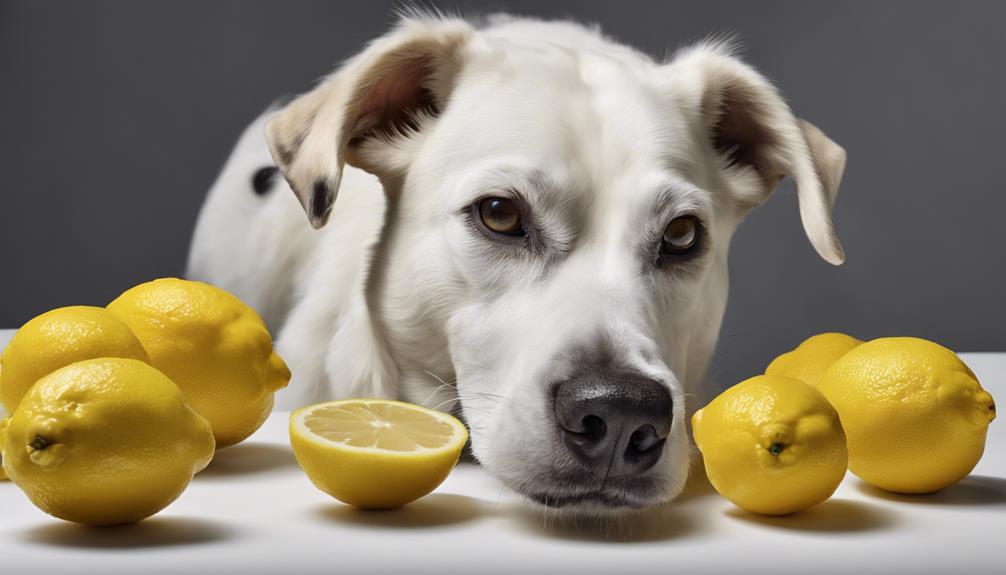Eating lemons is not safe for dogs. Lemons have compounds like psoralen and citric acid that can lead to vomiting, diarrhea, and abdominal pain. Lemon seeds may cause blockages in their intestines. Dogs lack the enzymes to digest lemons properly. Prevent lemon ingestion to avoid harm. Consider safe fruit alternatives like apples, bananas, and blueberries for your furry friend. If your dog ingests lemons, seek immediate veterinary care. Watch for symptoms and provide detailed information. Stay informed to keep your pet healthy and happy. You can discover more about dog-friendly foods for your beloved pet.
Key Takeaways
- Lemons are unsafe for dogs due to psoralen compounds, essential oils, and citric acid causing digestive issues.
- Ingesting lemons can lead to vomiting, diarrhea, abdominal pain, drooling, weakness, and lethargy in dogs.
- Lemon seeds pose a risk of intestinal blockages, necessitating immediate veterinary attention.
- Dogs lack enzymes to digest lemons, making them susceptible to serious health complications.
- Opt for safer fruit alternatives like apples, bananas, blueberries, carrots, and sweet potatoes for dogs.
Lemon Toxicity in Dogs
Lemon toxicity in dogs poses a serious risk to their health and well-being. Lemons, often enjoyed by humans, can be toxic to dogs. The psoralen compounds in lemons, along with their essential oils, can be harmful if ingested by our canine friends.
Even the seeds of lemons can lead to intestinal blockages in dogs if consumed. Citric acid found in lemons is another culprit that can upset a dog's stomach and cause various digestive issues. Dog owners should be cautious as dogs lack the necessary enzymes to properly digest citrus fruits like lemons, making them particularly susceptible to the negative effects of lemon ingestion.
Hence, dog owners need to be careful and prevent their dogs from eating lemons or any lemon-containing products to safeguard the safety and well-being of their furry companions.
Harmful Effects of Lemon Ingestion

Eating lemons can be harmful to dogs as it may cause vomiting, diarrhea, and abdominal pain. Additionally, excessive drooling, lethargy, and weakness are common symptoms of lemon poisoning in dogs.
Ingesting lemon seeds can also lead to intestinal blockages, while the citric acid in lemons can upset a dog's stomach and digestive system.
Lemon Toxicity in Dogs
Experiencing vomiting and diarrhea, lethargy, weakness, upset stomach, excessive drooling, and abdominal pain are potential harmful effects of dogs ingesting lemons. The citric acid in lemons can lead to upset stomach and gastrointestinal distress in our furry friends. Excessive drooling may indicate lemon poisoning, which requires immediate veterinary attention. Abdominal pain and discomfort are common symptoms seen in dogs that have consumed lemons. While dogs can eat some fruits in moderation, lemons can cause serious harm due to their critical nature. It's essential to keep lemons and other citrus fruits out of reach of your pets to prevent any accidental ingestion. Check out the table below for a quick summary:
| Harmful Effects of Lemon Ingestion |
|---|
| Vomiting and diarrhea |
| Lethargy and weakness |
| Upset stomach |
Digestive Issues From Lemons
Upon ingestion, lemons can trigger a range of digestive issues in dogs, including vomiting and diarrhea. The high citric acid content in citrus fruits like lemons can lead to upset stomach and discomfort in our furry friends.
If a dog consumes lemon rinds, it may create blockages in their digestive system, causing abdominal pain and potential harm. The toxic compounds present in lemons can result in serious digestive problems, further intensifying the risk.
Vomiting is a common reaction to lemon ingestion and a sign that a dog's body is trying to expel the harmful substances. To prevent such issues, it's essential to keep lemons and other citrus fruits out of reach of our canine companions.
Symptoms of Lemon Poisoning in Dogs

When dogs consume lemons, they might exhibit various signs of poisoning. These can comprise vomiting, diarrhea, excessive drooling, lethargy, weakness, and abdominal pain.
Recognizing these symptoms early and promptly seeking veterinary care if your dog has ingested lemons is crucial for their well-being.
Lemon Poisoning Signs
After ingesting lemons, dogs may exhibit various symptoms of lemon poisoning, including vomiting, diarrhea, excessive drooling, lethargy, weakness, and abdominal pain. Here is a table summarizing these signs:
| Lemon Poisoning Signs |
|---|
| Vomiting |
| Diarrhea |
| Excessive Drooling |
| Lethargy |
| Abdominal Pain |
If you notice your dog experiencing any of these symptoms after consuming lemons, it is important to seek veterinary care immediately. These signs can indicate a serious health issue that requires prompt attention. Remember, it is vital to keep harmful substances like lemons out of your dog's reach to prevent such incidents.
Dog Lemon Toxicity
We need to be aware of the symptoms of lemon poisoning in dogs, as it can lead to serious health issues that require immediate veterinary attention. If your dog has ingested lemons, watch out for signs like vomiting, diarrhea, excessive drooling, and lethargy. Abdominal pain and weakness are also common indicators of citrus ingestion.
Dogs may experience an upset stomach and discomfort after eating lemons, which can worsen if not addressed promptly. Remember, your furry friend's health is a top priority, so if you notice any of these symptoms, seek veterinary care right away to make sure your dog receives the necessary treatment.
Lemon Seed Dangers for Dogs

Regarding the ingestion of lemon seeds by dogs, potential dangers arise due to the risk of intestinal blockages. When dogs consume lemon seeds, especially in large amounts, it can cause serious health issues. The seeds are challenging for dogs to digest properly, which can lead to blockages in their intestines. These blockages can be painful for dogs and may require surgical intervention to remove them.
To keep your furry friend safe, it's important to avoid giving them lemons with seeds. Before feeding any part of the lemon to your dog, make sure to remove all seeds to prevent any potential risks. By being mindful of this simple step, you can help safeguard your dog's health and well-being. Remember, a little care in removing lemon seeds can go a long way in ensuring your dog stays happy and healthy.
Lack of Enzymes in Dogs for Lemons

As dogs lack the necessary enzymes, consuming lemons can result in digestive issues and potential toxicity. Lemons contain essential oils and compounds that are beneficial for humans but can be harmful to dogs. When a dog eats lemons, their bodies struggle to break down these components, leading to stomach upset and discomfort.
This absence of specific enzymes means that lemons aren't suitable for canine consumption. Ingesting lemons can pose serious health risks to dogs due to their inability to process the acidic fruit properly. It's vital to understand that even though lemons are safe for humans, they aren't something a dog can eat without potential consequences.
To safeguard your furry friend's well-being, it's best to keep lemons out of their reach and opt for dog-friendly treats that won't jeopardize their health. By being mindful of what your dog consumes, you can help prevent any unwanted health issues that may arise from ingesting unsuitable foods.
Preventing Dogs From Eating Lemons

To deter dogs from consuming lemons, consider using bitter apple spray as a vital measure. Lemons are harmful for dogs and can make your dog sick if consumed. It's important to keep your dog away from any amounts of lemon, including peels and seeds, as they can be dangerous to dogs.
Make sure that lemons and other citrus fruits are stored securely in closed cabinets or containers to prevent accidental ingestion. Educate your family members and guests about the dangers of feeding lemons to dogs to avoid any mishaps. If you suspect that your dog has consumed lemon or is showing signs of illness after being in contact with lemons, call your veterinarian immediately for guidance.
Safer Fruit Alternatives for Dogs

Dogs can enjoy a variety of safe fruit alternatives, such as apples, bananas, and blueberries. These fruits aren't only tasty but also good for your dog's health. Unlike lemons, which contain citric acid that can upset your dog's stomach and cause digestive issues, these safer options are gentle on your furry friend's tummy.
Apples are a great source of vitamins A and C, bananas provide potassium, and blueberries are packed with antioxidants. Carrots and sweet potatoes are also excellent choices for snacking. If you're looking for a protein-rich treat, plain cooked chicken or turkey can be a satisfying option.
Immediate Veterinary Care for Lemon Ingestion

After discussing safer fruit alternatives for dogs, immediate veterinary care is essential if your dog ingests lemons. When dealing with lemon ingestion, follow these essential steps:
- Contact a veterinarian: Reach out to a professional immediately to evaluate the situation and seek guidance on the next steps.
- Avoid inducing vomiting: Refrain from trying to make your dog vomit without proper veterinary advice after lemon consumption.
- Provide detailed information: Inform the vet about the quantity of lemon ingested to help them assess the potential risks accurately.
- Monitor for symptoms: Keep a close eye on your dog for signs such as vomiting, diarrhea, drooling, lethargy, or abdominal pain, and report any changes to the veterinarian promptly.
Frequently Asked Questions
What Happens if a Dog Eats a Lemon?
If a dog eats a lemon, it can cause upset stomach, vomiting, diarrhea, excessive drooling, abdominal pain, lethargy, weakness, and discomfort.
Ingesting lemon seeds may lead to intestinal blockages, requiring urgent veterinary care.
It's important to contact a veterinarian immediately for evaluation and treatment to prevent serious health issues.
Dogs should avoid eating lemons to stay safe and healthy.
How Much Lemon Is Safe for Dogs?
We recommend against feeding dogs any amount of lemons. Lemons are harmful to dogs, causing upset stomach, liver damage, and other serious health issues.
Even small amounts can lead to vomiting, diarrhea, and discomfort. Lemon peels, seeds, and essential oils are especially toxic.
It's important to prevent dogs from eating lemons to avoid health risks and emergencies. Keep these harmful fruits away from your furry friends for their safety.
Why Is My Dog Obsessed With Lemons?
We may notice our dogs being obsessed with lemons due to their strong scent, bitter taste, and the curiosity these characteristics trigger in them.
Dogs' keen sense of smell can attract them to the citrus aroma of lemons, sparking their interest as a form of exploration or play.
The sourness of lemons could also stimulate their taste buds, leading to a fascination with the fruit.
Can Dogs Have a Taste of Lemon?
We can offer dogs a taste of lemon, but the strong citrus flavor may not be attractive to them. However, it's important to avoid letting them consume lemons due to the potential harm they can cause.
Lemon ingestion can lead to symptoms like vomiting and diarrhea in dogs. Additionally, lemon peels contain toxic chemicals like psoralen, which can be harmful.
Hence, it's best to keep lemons away from our furry friends to keep them safe.
Can Lemons Positively or Negatively Impact a Dog’s Health?
It is essential for pet owners to be aware of potential delphinium toxicity in dogs. While lemons are generally safe for dogs in small amounts, consuming large quantities may upset their stomach and cause discomfort. It’s best to consult with a veterinarian before introducing any new foods to your dog’s diet.
Conclusion
To summarize, it isn't safe for dogs to consume lemons due to the potential toxicity and harmful effects they can have on your furry companion. It's crucial to keep lemons and lemon products out of reach to prevent accidental ingestion.
If you suspect your dog has eaten lemons, seek immediate veterinary care to guarantee their safety. Remember, when it comes to your dog's health, prevention is key. Stay vigilant and keep harmful substances away from your pets.









